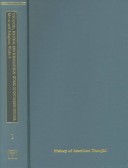Nineteenth-century American Thought S.
1 total work
Social, Political and Philosophical Works of Catharine Beecher
by Catharine Beecher
Published 15 May 2002
Catharine Beecher (1800-78) did a great deal to change assumptions about the place of women in American society. Best known as the foremother of home economics or "domestic science", she sought to give homemaking the status of a career - one as worthy and honourable as any of the well-paid professions then held exclusively by men. Outside the home, so Beecher argued, women should have access to higher education to prepare them for the teaching profession (Beecher herself founded Hartford Female Seminary and other leading women's colleges.) As teachers, women could bring to the nation the same benefits as they brought to their families as mothers. But Beecher was also a traditionalist. She objected to women entering the workforce in fields that she considered masculine, and she stoutly opposed women's suffrage. Besides her more public life as educator and campaigner, Beecher was a very considerable philosopher and social theorist, and her writings are now the subject of increasing attention. This six-volume collection includes Beecher's main philosophical works.
Her "Elements of Mental and Moral Philosophy" (1831) is one of the earliest books on philosophy of mind in the American canon. In "Common Sense Applied to Religion" (1857) Beecher sets out an ethical system of self-sacrifice, using a methodology borrowed from the Scottish School. Also included in the set is her anonymous "Essay on Cause and Effect" where she argues that a proper definition of cause makes clear the differentiation of mind and matter. Among three volumes of writings on the role and rights of women is "True Remedy", in which Beecher denounces factory work as unsuitable for women, her "Anti-Suffrage Petition", and "Woman's Profession as Mother and Educator" (1872). In these works she argues, among much else, that "the evils it is hoped to cure by the ballot would continue" so long as women's labour in the home was denied the respect given to men's paid work in the outside world. Most of these books are missing even from the largest research libraries, and this collection of Thoemmes Press facsimiles should be welcomed by scholars of American philososphy, history of education and women's studies.
Her "Elements of Mental and Moral Philosophy" (1831) is one of the earliest books on philosophy of mind in the American canon. In "Common Sense Applied to Religion" (1857) Beecher sets out an ethical system of self-sacrifice, using a methodology borrowed from the Scottish School. Also included in the set is her anonymous "Essay on Cause and Effect" where she argues that a proper definition of cause makes clear the differentiation of mind and matter. Among three volumes of writings on the role and rights of women is "True Remedy", in which Beecher denounces factory work as unsuitable for women, her "Anti-Suffrage Petition", and "Woman's Profession as Mother and Educator" (1872). In these works she argues, among much else, that "the evils it is hoped to cure by the ballot would continue" so long as women's labour in the home was denied the respect given to men's paid work in the outside world. Most of these books are missing even from the largest research libraries, and this collection of Thoemmes Press facsimiles should be welcomed by scholars of American philososphy, history of education and women's studies.
